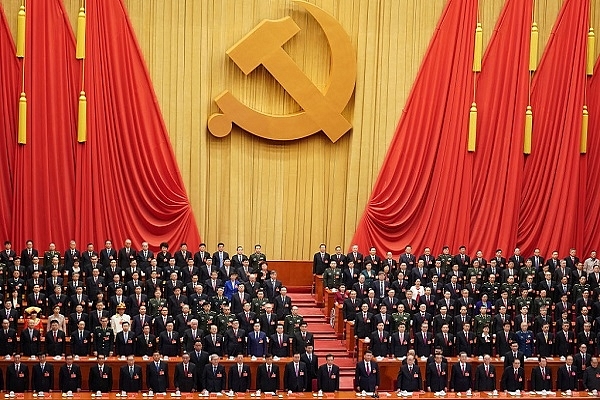World
Deconstructing The Dragon Through Literature And Popular Culture
- China doesn't seem to have a concept of a neighbour. It does not see any role of India in the Asian renaissance.

Great Hall of the People in China. (Lintao Zhang/Getty Images)
Do you remember the scene in the film Arrival, where the tense world powers have to placate China, lest it start a war against a benevolent alien civilisation?
The cinematic representation of China as an aggressor in Arrival is not far from real life.
Literary fiction coming out of China can give a glimpse into the Chinese playbook of looking at the rest of the world vis-a-vis its own position in the global power structure.
Liu Cixin, the Chinese science fiction writer in his award winning trilogy, Remembrance of Earth’s Past writes,
‘The universe is a dark forest. Every civilization is an armed hunter stalking through the trees like a ghost, gently pushing aside branches that block the path and trying to tread without sound. Even breathing is done with care. The hunter has to be careful, because everywhere in the forest are stealthy hunters like him. If he finds other life – another hunter, an angel or a demon, a delicate infant or a tottering old man, a fairy or a demigod – there’s only one thing he can do: open fire and eliminate them.’
and
‘“…do you know what the greatest expression of regard for a race or civilization is?”
“No, what?”
“Annihilation. That’s the highest respect a civilization can receive. They would only feel threatened by a civilization they truly respect.”’
The two excerpts are not merely pieces of fiction, but a reflection of the Chinese gaze.
This is the Chinese subconscious inadvertently finding a shape in a science fiction writer’s words.
This is no more just a wounded civilisation justified in its current ruthlessness to avenge its once battered pride. This is a remorseless hegemon which has always been mistrustful of others, or perhaps, a hundred years of Communism have turned it so.
This is a hunter on prowl, which has more tricks in its armour than you can imagine.
Do you wonder why Beijing’s Peking University has launched, ‘an ambitious programme to train more than 60 Chinese students in Sanskrit, with the hope of creating a team of researchers to help translate hundreds of manuscripts containing scriptures that have been found in Tibet and other centres of Buddhism, such as Hangzhou in China’s east’ (The Hindu, 16, May 2011)?
This is no love lost for an Indian language or the Indian culture. This is a prowler’s stealthy step into understanding the cultural secrets of a ‘threat’, to understand the reason for its antiquity and continuity, and to use this knowledge at an opportune moment against it.
While we can not underestimate China’s ability to sell us back our own knowledge, we can also be absolutely sure of it using our own people against us.
In May 2019, an Indian film star, whose films had broken the box office records in China was an unofficial attendee at the Conference on Dialogue of Asian Civilisations convened by President Xi Jinping, where India decided not to send any official delegate.
The said star’s ‘economic interest in the Chinese entertainment market is so significant [that he]…has become a strong advocate of improved Sino-Indian relations and people-to-people contacts. He has called for further deepening of bilateral cooperation in the film industry and “praised the Chinese public for their open attitudes towards foreign culture and movies” (Routledge Handbook of China India Relations; Kanti Bajpayi, Selina Ho, Manjari Chaterjee Miller). This is poaching done perfectly on the lines of the CCP playbook.
India’s diplomatic relationship with and its security strategy against China must take into account the fact that for China the world is a ‘dark forest’ and not an arena for Vasudhaiva Kutumbakam.
Another country is ‘another hunter’, which must be annihilated at any cost. China does not have a concept of neighbour. It does not see any role of India in the Asian renaissance. China unequivocally wants, what Michael Pillsbury in his book, The Hundred-Year Marathon, calls “an era of unipolar dominance”.
India must realise that the dragon doesn’t recognise a democracy; it will always spit betrayal and fire. The conscience-less ‘armed hunter is stalking through the trees’, nibbling on us territorially, reading and writing us psycho-culturally. Are we looking out?
Support Swarajya's 50 Ground Reports Project & Sponsor A Story
Every general election Swarajya does a 50 ground reports project.
Aimed only at serious readers and those who appreciate the nuances of political undercurrents, the project provides a sense of India's electoral landscape. As you know, these reports are produced after considerable investment of travel, time and effort on the ground.
This time too we've kicked off the project in style and have covered over 30 constituencies already. If you're someone who appreciates such work and have enjoyed our coverage please consider sponsoring a ground report for just Rs 2999 to Rs 19,999 - it goes a long way in helping us produce more quality reportage.
You can also back this project by becoming a subscriber for as little as Rs 999 - so do click on this links and choose a plan that suits you and back us.
Click below to contribute.
Latest